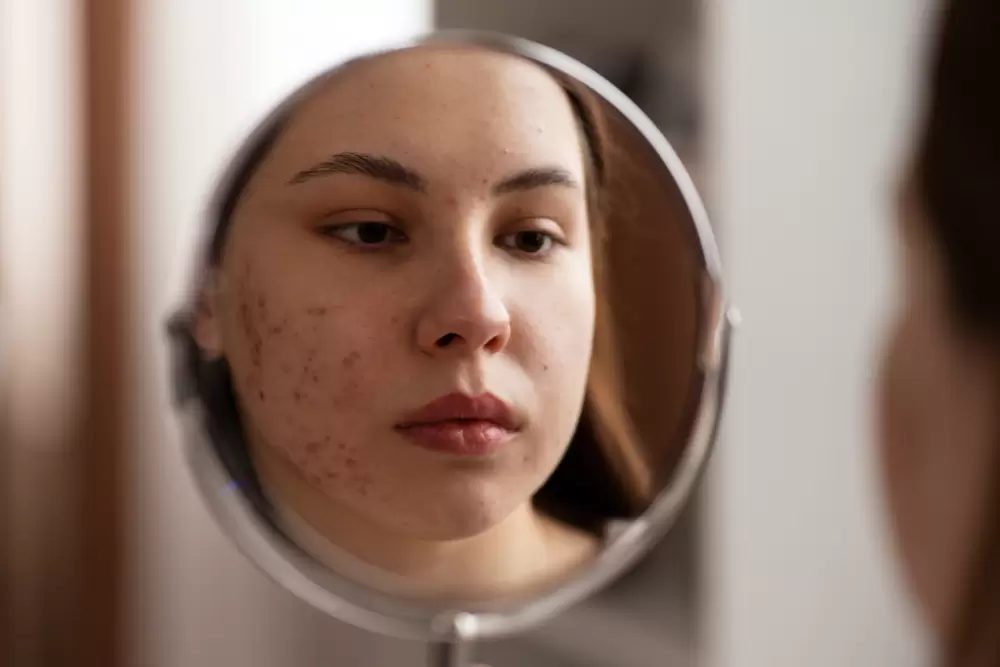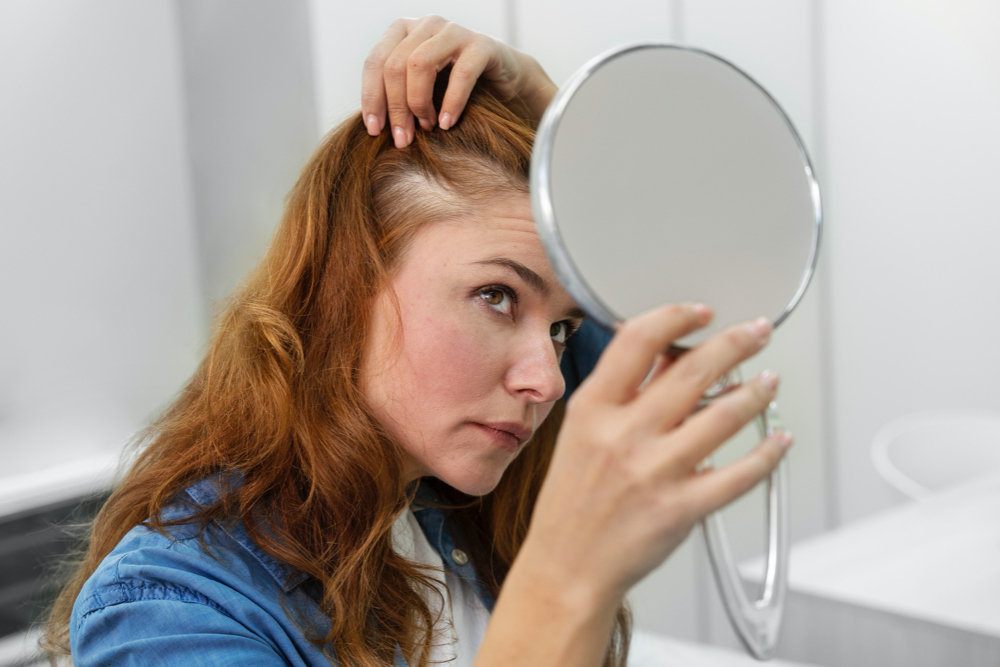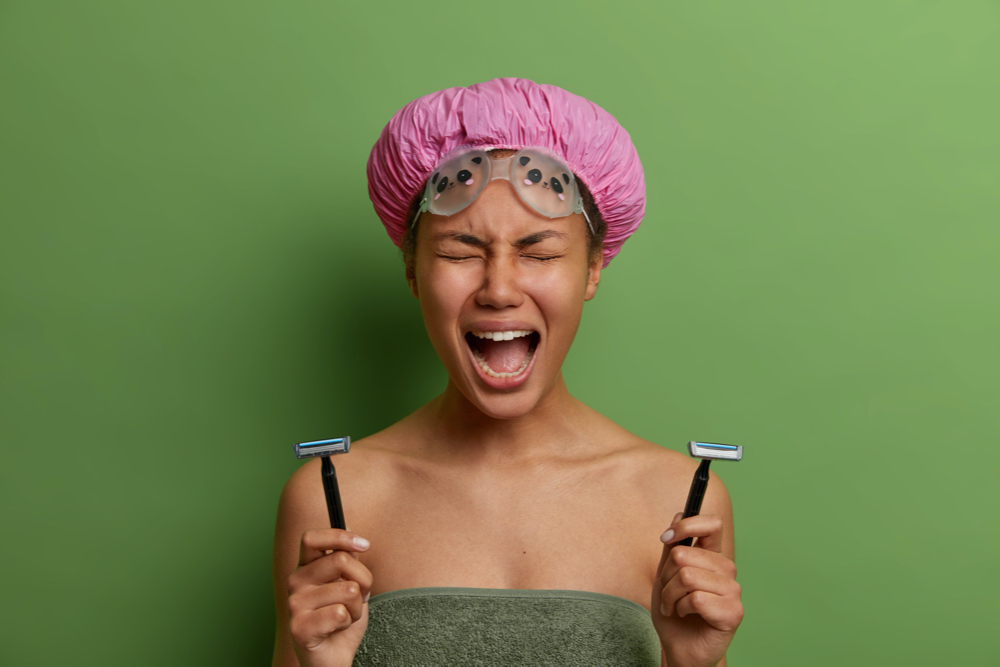- Fast results
- 4,000+ locations
- 4.8 star rating
Need Help? (888) GET LABS


Testosterone in women? It may come as a shock for some people because testosterone is primarily a male hormone, but women do produce testosterone in smaller amounts. Thus, it can be alarming to learn if you have elevated testosterone.
In most cases, high testosterone in women is associated with a much-concerning disorder, which is why knowing the signs early on can help speed up treatment. Let’s dive into spotting high testosterone in women by understanding these signs.
| This article focuses on research specific to individuals assigned female at birth during the studies and may not be generalizable to the entire population. |

Testosterone promotes increased production of sebum from the sebaceous glands. Sebum is an oily substance that preserves skin moisture.
Excessive sebum combines with dead skin cells and dirt, clogging the hair follicles. As a result, it creates comedones, a plug in the pores that encourages bacteria to grow and cause inflammation as well as acne lesions(1).

Women with high testosterone are at risk of developing androgenetic alopecia, a type of hair loss that starts with the thinning of the hair on top of the scalp. Androgenetic alopecia widens the part line.
Not all women with elevated testosterone experience hair loss. Those who do often have a genetic sensitivity to DHT (dihydrotestosterone)(2), a more potent form of androgen resulting from the action of testosterone and an enzyme called 5-alpha reductase.
DHT binds with the hair follicle receptors, shrinking the hair. Eventually, the hair becomes shorter and thinner so that it’s not easily visible on top of the head anymore.
Also Read: What Blood Tests to Take for Sudden Hair Loss (Alopecia)?

High testosterone in women can lead to hirsutism(3)(4), in which hair growth can be observed in areas similar to men. Mail-like hair growth can be visible on the face and chest, as testosterone stimulates the process in these areas.
Similar to hair loss, genetics influences one’s inclination to hirsutism. If one is much more sensitive to androgens or has other underlying conditions that promote hair growth, they are likely to develop hirsutism.
If you have more testosterone than normal, chances are other reproductive hormones become repressed, including estrogen. Unlike testosterone, estrogen is produced in high levels during the menstrual cycle’s mid-follicular phase.
Estrogen also plays a primary role in developing breast tissue(5), both the fatty and glandular types. With less estrogen, the fatty tissues can be overpowered by the glandular tissues, as testosterone leans toward its development more. As a result, the breasts may look smaller.
Testosterone thickens the vocal cords, deepening your voice(6). Among young males, they begin to notice this change during puberty when testosterone levels are surging(7). For women with high levels of testosterone, this is a possibility. It may not necessarily be as deep as that of many men, but the significant change in pitch will be hard not to notice.
Testosterone, an anabolic hormone, drives muscle growth(8). It stimulates protein synthesis that makes new muscles. Plus, it prevents too much muscle breakdown and promotes repair and growth.
Hence, if you’re a woman with elevated testosterone, you might have a higher proportion of fast-twitch muscle fibers that easily expand with strength training.
Too much testosterone in women can interfere with ovulation(9), the process wherein the ovaries produce the egg cells. Without ovulation, there wouldn’t be menstruation.
In addition, high testosterone can also stem from PCOS, which triggers hormone imbalance, causing fluctuating or irregular periods. On top of that, PCOS is also associated with insulin resistance that influences testosterone levels.

The hormonal disruption due to elevated testosterone that leads to irregular periods or its complete absence makes it difficult for women to conceive.
High testosterone levels can also adversely impact egg quality(10) and the ability of the endometrium to receive the fertilized egg (zygote). As a result, even if you do conceive, the chances of the zygote surviving are diminished.
Also Read: Everything You Need To Know About the Anti-Mullerian Hormone Test for Ovarian Reserve
Libido in women can be tricky as it requires a good balance between key hormones like estrogen and testosterone(11). For women with high levels of testosterone, the condition can decrease sexual desire as the delicate balance is disrupted. It’s also likely that excess testosterone gets converted to estrogen, which further restrains libido.
Contrary to popular belief, hormones do not function in isolation. Any changes in one hormone can influence how the others work. That said, if women have above-normal testosterone levels, they can impact other hormones and neurotransmitters that regulate mood.
The imbalance also disrupts sleep and triggers unpleasant symptoms that challenge a woman’s self-esteem, like excessive facial hair, acne, and hair loss. All these can cause depression, anxiety, and fluctuations in a woman’s mood(12).
It’s unlikely that elevated testosterone in females is caused by factors other than an underlying medical condition. High testosterone is a symptom of a health problem that requires significant attention, including the following:
Around five million women(13) suffer from polycystic ovary syndrome (PCOS) in the US. PCOS is a hormonal disorder in women that causes excess production of androgens, including testosterone. Women may develop fertility problems, but PCOS can be managed with proper lifestyle changes and treatment.
| Did You Know? Diagnosing PCOS requires several tests–not just a testosterone test. You will likely have to take a comprehensive female hormone blood test and a pelvic exam. Likewise, your gynecologist will look into your medical and family history on top of the symptoms you’re experiencing. |
Rare as it is, high testosterone in women can be linked to the formation of tumors that trigger the overproduction of testosterone. These androgen-releasing tumors(14) typically develop in the ovaries and adrenal glands, which are organs that secrete androgens.
Also known as CAH, congenital adrenal hyperplasia is a collective term for disorders affecting the adrenal glands. It’s a rare condition that inhibits the production of certain hormones but triggers excessive release of testosterone.
Cushing disease is typically caused by a tumor in the pituitary gland. As a result, it forces the body to produce more cortisol, a hormone secreted by the adrenal glands. Cortisol is a primary stress hormone that facilitates physiological responses during stressful conditions.
Aside from cortisol, Cushing disease also leads to the overstimulation of adrenal glands, which also produces excessive amounts of other hormones. These include testosterone.
Treating high testosterone in women means uncovering the underlying medical disorder. By addressing the cause, this hormone will subsequently level to the normal range. In this process, the following treatment may be recommended:
Much like self-diagnosis, treating high testosterone in women can harm your health, especially if medications are involved. Make sure to consult your doctor.
Nevertheless, several suggestions above can be made as a general approach to good health, such as getting adequate quality sleep, exercising, stress management, etc. You can start with these actions and track the results.
Fatty fish, flaxseeds, licorice roots, and red reishi mushrooms can help lower testosterone in women. Drinking peppermint or spearmint tea is also said to have the same effect. However, before increasing your intake of these foods, consult your doctor first to avoid any unwanted interactions with prescribed medications.
Studies have shown that some women with higher testosterone than normal also have anxiety. This is likely due to the hormonal imbalance that impacts mood regulation. Still, it’s unlikely that elevated testosterone alone can heighten anxiety. Talk to your doctor to uncover other triggers and learn the best course of treatment.
You can supplement medical treatment for the underlying health problem that led to elevated testosterone. These include changing your diet, exercising regularly, getting enough sleep, and other lifestyle adjustment. However, the natural approach alone is less likely to treat high testosterone in women.
High testosterone in women in itself is not necessarily alarming, especially if you can address the condition through lifestyle adjustments. However, since it is a critical symptom of PCOS and ovarian tumors, it shouldn’t be ignored. That said, it’s best to consult your doctor for proper diagnosis and corresponding treatment.
1 Carmina E, Dreno B, Lucky WA, Agak WG, Dokras A, Kim JJ, Lobo RA, Ramezani Tehrani F, Dumesic D. Female Adult Acne and Androgen Excess: A Report From the Multidisciplinary Androgen Excess and PCOS Committee. J Endocr Soc. 2022 Feb 6;6(3):bvac003. doi: 10.1210/jendso/bvac003. Erratum in: J Endocr Soc. 2023 Jan 24;7(3):bvad006. PMID: 35155970; PMCID: PMC8826298.
2 Grymowicz M, Rudnicka E, Podfigurna A, Napierala P, Smolarczyk R, Smolarczyk K, Meczekalski B. Hormonal Effects on Hair Follicles. Int J Mol Sci. 2020 Jul 28;21(15):5342. doi: 10.3390/ijms21155342. PMID: 32731328; PMCID: PMC7432488.
3 Yilmaz B, Yildiz BO. Endocrinology of Hirsutism: From Androgens to Androgen Excess Disorders. Front Horm Res. 2019;53:108-119. doi: 10.1159/000494907. Epub 2019 Sep 9. PMID: 31499500.
4 Hohl A, Ronsoni MF, Oliveira Md. Hirsutism: diagnosis and treatment. Arq Bras Endocrinol Metabol. 2014 Mar;58(2):97-107. doi: 10.1590/0004-2730000002923. PMID: 24830586.
5 Ekstrand J, Zemmler M, Abrahamsson A, Lundberg P, Forsgren M, Dabrosin C. Breast Density and Estradiol Are Major Determinants for Soluble TNF-TNF-R Proteins in vivo in Human Breast Tissue. Front Immunol. 2022 Mar 30;13:850240. doi: 10.3389/fimmu.2022.850240. PMID: 35432372; PMCID: PMC9005790.
6 Chadwick KA, Simpson CB, McGarey PO Jr, Estes CM, Nix J, Sulica L. Voice Change Following Testosterone Supplementation in Women: A Multi-Institutional Case Series. J Voice. 2021 Nov;35(6):936.e1-936.e7. doi: 10.1016/j.jvoice.2020.03.008. Epub 2020 May 5. PMID: 32386906.
7 Zamponi V, Mazzilli R, Mazzilli F, Fantini M. Effect of sex hormones on human voice physiology: from childhood to senescence. Hormones (Athens). 2021 Dec;20(4):691-696. doi: 10.1007/s42000-021-00298-y. Epub 2021 May 28. PMID: 34046877; PMCID: PMC8594207.
8 Hirschberg AL. Female hyperandrogenism and elite sport. Endocr Connect. 2020 Apr;9(4):R81-R92. doi: 10.1530/EC-19-0537. PMID: 32197237; PMCID: PMC7159262.
9 Sjaarda LA, Mumford SL, Kuhr DL, Holland TL, Silver RM, Plowden TC, Perkins NJ, Schisterman EF. Association of testosterone and antimüllerian hormone with time to pregnancy and pregnancy loss in fecund women attempting pregnancy. Fertil Steril. 2018 Mar;109(3):540-548.e1. doi: 10.1016/j.fertnstert.2017.11.014. Epub 2018 Feb 7. PMID: 29428315; PMCID: PMC5866225.
10 Eini F, Kutenaei MA, Foroutan T, Salehi E. High levels of follicular fluid testosterone could impair oocyte developmental competency via affecting aryl hydrocarbon receptor pathway in PCOS patients. BMC Mol Cell Biol. 2022 Nov 11;23(1):47. doi: 10.1186/s12860-022-00449-y. PMID: 36368943; PMCID: PMC9650820.
11 Cappelletti M, Wallen K. Increasing women’s sexual desire: The comparative effectiveness of estrogens and androgens. Horm Behav. 2016 Feb;78:178-93. doi: 10.1016/j.yhbeh.2015.11.003. Epub 2015 Nov 14. PMID: 26589379; PMCID: PMC4720522.
12 Maharjan DT, Syed AAS, Lin GN, Ying W. Testosterone in Female Depression: A Meta-Analysis and Mendelian Randomization Study. Biomolecules. 2021 Mar 10;11(3):409. doi: 10.3390/biom11030409. PMID: 33802106; PMCID: PMC7999217.
13 Centers for Disease Control and Prevention (2022, December 30). PCOS (Polycystic Ovary Syndrome) and Diabetes. Retrieved March 26, 2024, from https://www.cdc.gov/diabetes/basics/pcos.html#:~:text=PCOS%20is%20one%20of%20the,US%20women%20of%20reproductive%20age.
14 Di Dalmazi G. Hyperandrogenism and Adrenocortical Tumors. Front Horm Res. 2019;53:92-99. doi: 10.1159/000494905. Epub 2019 Sep 9. PMID: 31499503.


We now offer pharmacy discounts through our PersonalabsRx platform.
We now offer pharmacy discounts through our PersonalabsRx platform.